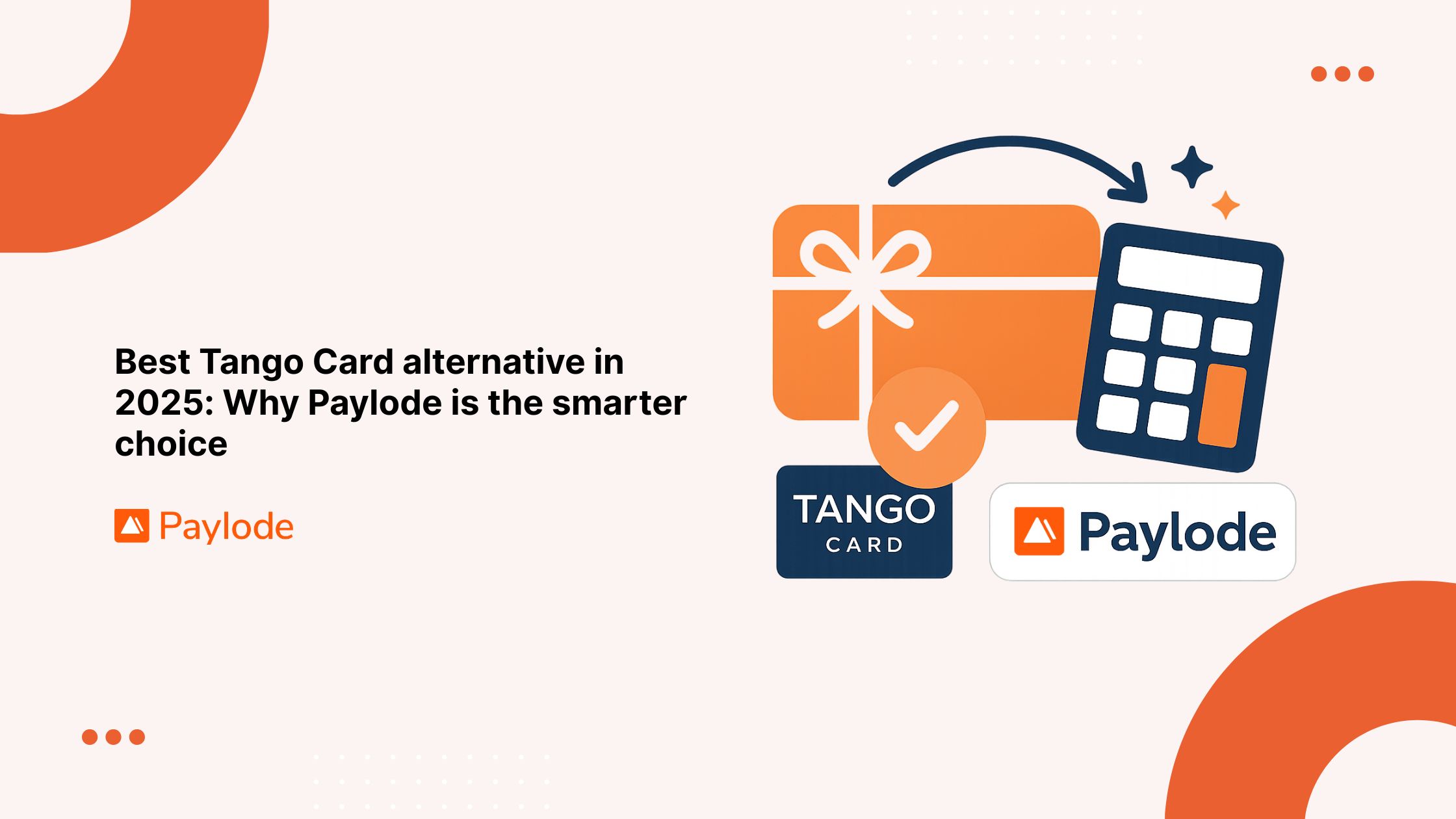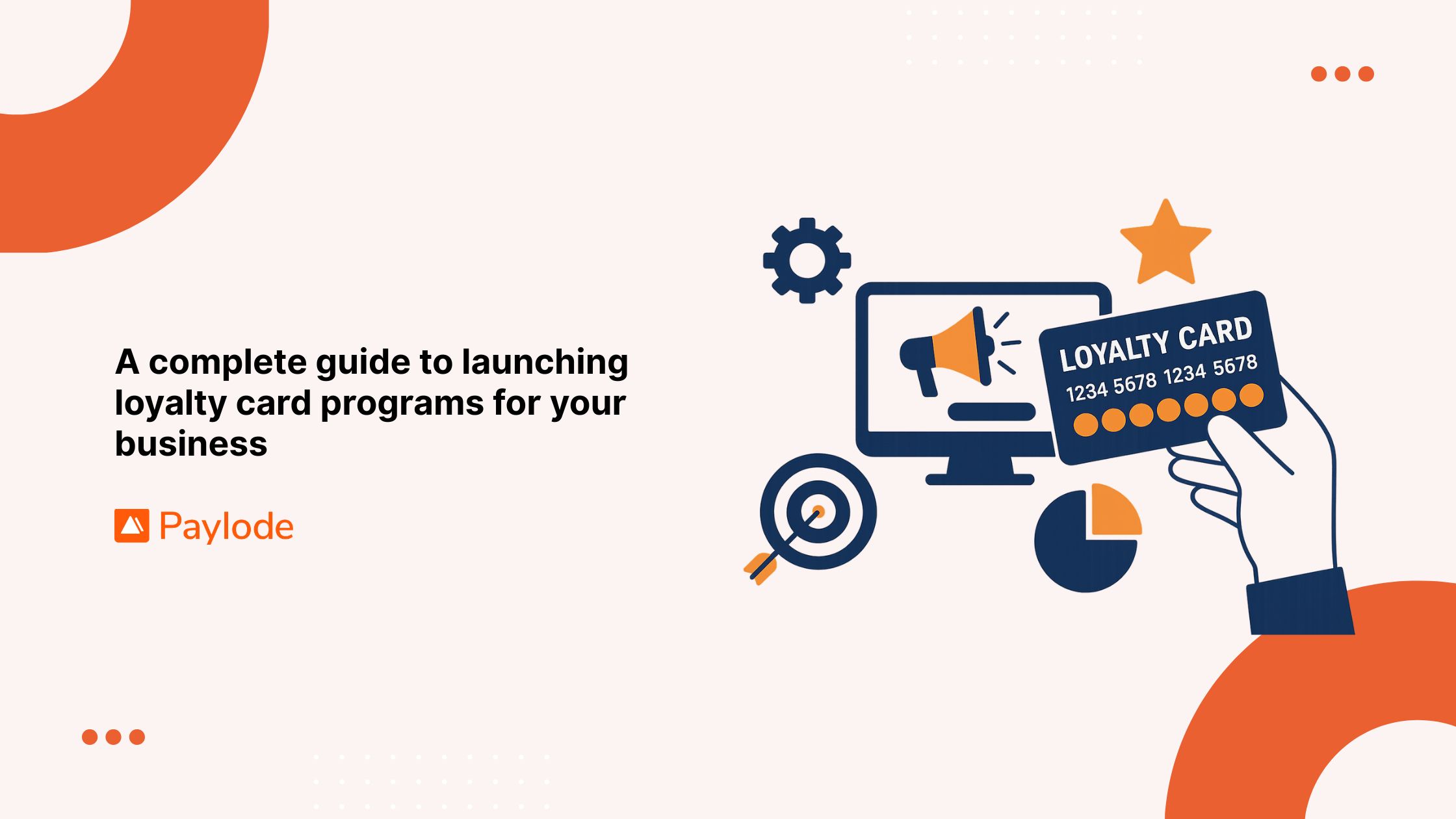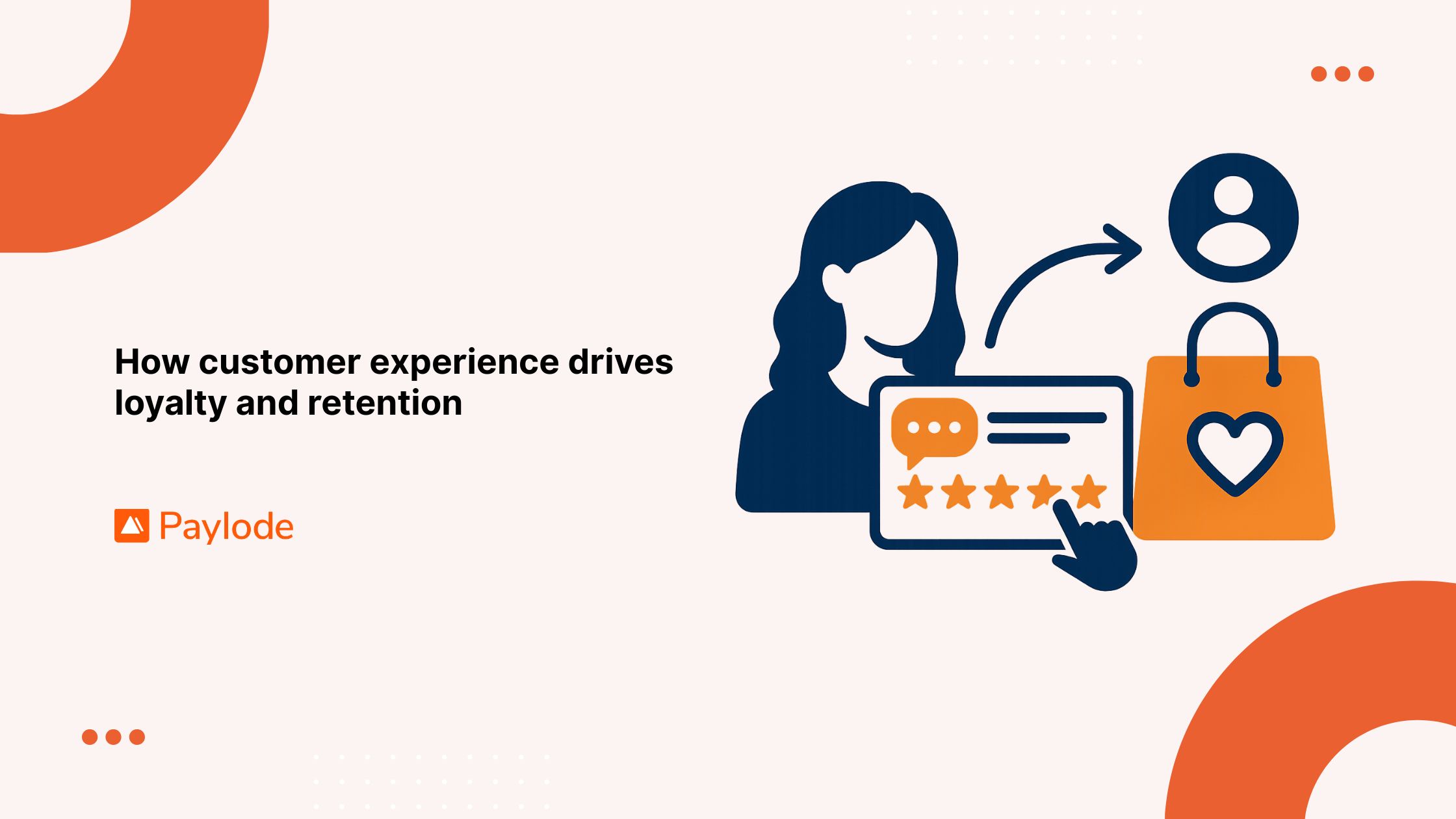How to Retain Customer Loyalty
Table of Content
- 1. Understanding Customer Loyalty
- 1.1 Why is Loyalty Important?
- 1.2 Types of Loyalty Programs
- 1.3 The Role of Customer Satisfaction
- 2. Designing Effective Loyalty Programs
- 2.1 Key Elements of a Successful Program
- 2.2 Incorporating Paylode: Boosting Engagement
- 2.3 Personalizing Rewards to Enhance Value
- 3. Leveraging Technology for Loyalty
- 3.1 Digital Platforms and Apps
- 3.2 Benefits of Omnichannel Rewards
- 3.3 Integrating Perks with Paylode
- 4. Measuring Loyalty Program Success
- 4.1 Key Metrics to Track
- 4.2 Utilizing Feedback for Improvement
- 4.3 The Impact of Loyalty on Business Growth
- 5. Case Studies: Loyalty in Action
- 5.1 Paylode’s Success Stories
- 5.2 Learning from Industry Leaders
- 5.3 Adapting Strategies for Your Business
Building a robust customer loyalty framework doesn't just happen overnight. You may spend countless hours refining strategies, only to find that customers are slipping through the cracks or not engaging as expected. Why does this happen, and how can you turn the tide? By understanding the nuances of customer loyalty and crafting the right retention strategies, you can increase lifetime value and maintain customer engagement. Here's what you need to know to secure customer loyalty for the long haul.
1. Understanding Customer Loyalty
1.1 Why is Loyalty Important?
Customer loyalty is crucial for sustaining a business's growth and profitability. Loyal customers often act as brand ambassadors, spreading positive word of mouth. They are more likely to make repeat purchases and less susceptible to competitive offers. This results in decreased marketing costs since retaining a loyal customer is generally less expensive than acquiring a new one. Furthermore, loyal customers typically purchase more over time, increasing the customer lifetime value.
According to a recent study on customer loyalty statistics, businesses focusing on loyalty programs see an average increase in revenue of 15-20%. This data underscores how pivotal loyal customers are to your bottom line. By maintaining their trust, you don't just benefit financially; you also build a solid foundation and reputation that attracts more patrons.
1.2 Types of Loyalty Programs
Loyalty programs come in different forms, each designed to incentivize and reward customers uniquely. Points-based systems are popular, where customers earn points for purchases that can later be redeemed for rewards. Tiered programs provide different levels of benefits, motivating customers to climb the ranks for better perks. Additionally, subscription-based loyalty programs offer exclusive services or products at a regular rate, fostering ongoing engagement.
For the recent generation, like Gen Z, loyalty programs need to be aligned with values. They lean towards brands that make a genuine impact socially and environmentally. To understand how Gen Z values brand loyalty, focusing on shared values and innovative experiences can be more effective than traditional loyalty schemes.
1.3 The Role of Customer Satisfaction
Customer satisfaction is the bedrock of customer loyalty. It is not only about meeting expectations but exceeding them at every touchpoint. When customers feel valued and their needs are consistently met, they are more likely to return. In essence, satisfaction leads to loyalty, which can then be measured through metrics such as Net Promoter Score (NPS) and Customer Satisfaction Score (CSAT).
To effectively enhance customer satisfaction, personalize experiences by leveraging data insights. Recognize individual needs and preferences and tailor products, services, or communication. Implementing dedicated feedback loops can capture valuable insights, allowing you to refine the strategies continually. High satisfaction leads to higher retention, proving that investing in customer happiness pays off significantly.
Pro-tip: Regularly analyze feedback to identify recurring issues swiftly. Address common pain points promptly to keep satisfaction levels consistently high, setting the stage for lasting loyalty.
2. Designing Effective Loyalty Programs
2.1 Key Elements of a Successful Program
Creating a successful loyalty program isn't just about offering perks—it's about understanding your customer's specific needs and preferences. A well-rounded program should address multiple angles, including frequent engagement, ease of use, and valuable rewards. You can start by asking yourself:
- What actions do you want to motivate? Identify the actions, like renewals or paperless billing, that can significantly impact your business.
- How will you track the program's performance? Use tools that allow seamless tracking, helping you adjust strategies based on tangible data.
- What types of rewards resonate with your audience? Offering relevant perks is key to maintaining interest and ensuring participation.
One way to successfully implement these elements is through Boost Engagement, which allows you to tailor perks to motivate specific actions. Our platform enables effective engagement by aligning incentives with desired behaviors, boosting customer interaction over their lifecycle.
2.2 Incorporating Paylode: Boosting Engagement
The Paylode platform affords a unique edge when designing loyalty programs by providing a comprehensive suite of features that facilitate enhanced engagement. These features include:
- Boost Campaigns: Custom actions like signing up, going paperless, or participating in surveys can be incentivized effectively.
- Perk Centers and Widgets: Display perks in your booking flows, SMS, emails, and more to create a seamless reward experience for the customer journey.
Implementing these tools could save your team hours of repetitive tasks while maximizing the return through automation and personalization. Moreover, this approach facilitates the retention of customers, as noted by Trinity Ojo from Motel 6, who highlights the benefits Paylode brings to hospitality by enhancing guest comfort and engagement through tailored programs.
2.3 Personalizing Rewards to Enhance Value
Personalization plays a crucial role in making loyalty programs more appealing and effective. Using data-driven insights, you can customize perks to match individual preferences, significantly increasing customer satisfaction and lifetime value. Here's how to personalize effectively:
- Analyze Customer Data: Identify trends and preferences using transaction history, engagement patterns, and feedback.
- Tailor Rewards: Adjust the rewards based on customer segmentation, offering exclusive perks to high-value customers.
- Leverage Technology: Employ platforms like Paylode's Boost Engagement that provide the flexibility to personalize offerings without extensive technical resources.
This personalized approach not only fosters loyalty but can also lead to a marked improvement in customer engagement and retention, ultimately contributing positively to your bottom line.
3. Leveraging Technology for Loyalty
3.1 Digital Platforms and Apps
You're in a world where 80% of your customers expect fast and convenient interactions. Building a loyalty program without leveraging technology is like sending a message in a bottle—it might eventually get there, but it won't be timely or effective. Digital platforms and apps provide a fast lane, enabling you to connect with customers efficiently. With tools like Paylode’s platform, you can embed perks directly into your customer journey, whether you're in telecom, real estate, insurance, or subscription services.
- Integration: With Paylode's no-code integration tools, you seamlessly embed perks into every step of a customer's journey. This seamless integration avoids disruptions and keeps customers engaged.
- Customization: Whether you aim to drive paperless billing, lease renewals, or autopay adoption, you can tailor incentives to meet specific customer behaviors.
Pro-tip: Begin by assessing your current customer journey. Identify touchpoints where a digital boost could enhance customer interactions and loyalty.
3.2 Benefits of Omnichannel Rewards
Customers today interact with brands on multiple platforms—from websites and apps to social media and emails. Omnichannel rewards are a golden opportunity to meet your customers where they are, providing consistent, relevant incentives across all touchpoints. According to a study from Aberdeen Group, companies with strong omnichannel capabilities retain 89% of their customers, compared to 33% for those that don't.
Key Benefits:
- Consistency: Keeps your brand message clear and unified, regardless of where the customer interacts.
- Increased Reach: Engage customers who might not have interacted through a single channel, increasing chances for loyalty.
- Enhanced Personalization: Tailoring offers based on channel-specific behavior ensures each touchpoint feels unique and relevant.
Adopting an omnichannel approach saves time and effort while maximizing your program’s reach and effectiveness. Imagine including perks in your emails, SMS, and even posters using Paylode's Marketplace tools, making it easy for customers to redeem offers wherever they are.
3.3 Integrating Perks with Paylode
Integrating perks into your loyalty strategy without a guided approach can feel like herding cats. With Paylode, however, perks aren’t just add-ons but become critical drivers of engagement. By using Paylode, businesses can effortlessly integrate perks into everyday interactions, motivating specific customer actions and behaviors.
Actions to Take:
- Perk Widgets: Insert perks into booking flows or informational pages, increasing conversion rates by offering instant rewards.
- Omnichannel Links: Utilize omnichannel links in your communications to ensure perks are always within reach for customers.
- Dashboard Insights: Monitor and optimize your perk program performance using Paylode’s dashboard, allowing you to stay agile and adaptive.
When you're able to showcase perks on various platforms—whether through a dedicated perks center on your site or inline with booking flows—you ensure that your incentives are both visible and valuable, leading to higher retention rates and greater customer satisfaction.
4. Measuring Loyalty Program Success
4.1 Key Metrics to Track
Tracking the right key metrics can provide insights into your loyalty program's effectiveness. Start with Customer Lifetime Value (CLV), which helps you understand the long-term value of a customer to your business. Higher CLV indicates successful engagement and retention strategies. Repeat Purchase Rate is another vital metric; it shows how often customers return to buy more, reflecting the loyalty fostered by your program. Additionally, you can measure Redemption Rate—how frequently customers use their rewards. A high rate usually signifies appealing and relevant rewards. It's also important to calculate the Net Promoter Score (NPS), which evaluates customer satisfaction and willingness to recommend your brand.
To optimize tracking, implement a robust dashboard like Paylode’s, which consolidates these metrics for real-time analysis. With Paylode, you can not only track these critical metrics but also interpret the data efficiently. The inclusion of dashboards empowers marketing leaders to adjust strategies promptly to foster loyalty.
Pro-tip: Regularly compare your metrics against industry benchmarks to identify areas of improvement and potential competitive advantages.
4.2 Utilizing Feedback for Improvement
Gathering and acting on customer feedback is crucial for enhancing your loyalty program. Begin by conducting surveys and collecting customer testimonials to gauge satisfaction and areas needing improvement. Encourage customers to share their experiences with both your program and perks. Feedback collected by methods like NPS surveys can guide improvements and align your rewards with customer desires. Paylode allows embedding perks in customer feedback workflows, incentivizing participation with perks, thus gathering meaningful insights.
Closed-loop feedback systems provide actionable insights. For instance, after gathering feedback, immediately address concerns, and notify the customer of improvements. This responsive approach boosts customer trust and program effectiveness. Documenting common feedback trends enables targeted adjustments to offerings, increasing overall satisfaction.
Pro-tip: Use feedback to identify your most and least popular perks, ensuring your program evolves with customer preferences.
4.3 The Impact of Loyalty on Business Growth
Loyalty programs are more than just customer retention tools; they can drive significant business growth. A well-structured program enhances customer engagement, leading to increased sales and repeat business. According to a recent study by Bond, 73% of consumers are more likely to recommend brands with good loyalty programs (Bond, 2023). This kind of advocacy naturally boosts acquisition rates, while a focus on reducing churn keeps existing revenue stable.
Loyalty programs that leverage tools like Paylode encourage specific customer actions that elevate both engagement and brand loyalty. By offering valuable perks that resonate with your audience—such as discounts in high-demand industries like telecommunications or insurance—you not only retain current customers but also attract new ones. This creates a cycle of growth as each happy customer becomes an advocate.
Pro-tip: Integrate loyalty program benefits into your broader marketing strategy to maximize both immediate sales and long-term customer retention.
5. Case Studies: Loyalty in Action
5.1 Paylode’s Success Stories
Paylode has a track record of transforming customer engagement for its clients across various industries. Real estate companies, like June Homes, have leveraged Paylode’s perks to enhance tenant satisfaction. By integrating local discounts and special offers into tenant portals, these companies have reduced churn and built long-lasting tenant relationships. August saw a 15% decrease in tenant turnover for June Homes after implementing Paylode.
Moreover, the insurance industry has used Paylode to effectively drive customer loyalty. By offering incentives like grocery coupons and wellness perks, insurance firms encourage policyholders to stick with autopay options, reducing payment lapses. According to internal metrics, policy renewals saw a 12% increase after introducing Paylode's automated rewards strategies, demonstrating its impact on customer retention.
Pro-tip: Consider using incentives that align directly with your industry's pain points to significantly move the needle on customer loyalty.
5.2 Learning from Industry Leaders
Examining industry leaders who have adopted advanced customer retention strategies can provide invaluable insights. Companies like Motel 6 have successfully used Paylode to craft personalized guest experiences that foster loyalty. They offer tailored perks that enhance a guest’s stay, from exclusive discounts to personalized travel packs, resulting in a noticeable increase in repeat stays and positive reviews.
An example from the subscription services sector highlights how such companies utilize Paylode for unique campaigns aimed at renewals. These services offer exclusive brand discounts and premium upgrades, and customer participation has risen by 22%; a direct result of integrating these perks with user-friendly engagement tools. Harnessing such tailored strategies positions these leaders ahead by creating compelling reasons for customers to remain loyal.
5.3 Adapting Strategies for Your Business
If you're considering implementing customer loyalty strategies similar to those used by industry leaders, start by identifying the unique needs within your customer base. Analyzing past feedback and behavior will guide initial steps. Paylode's dynamic integration tools make it simpler to embed these programs into existing workflows. From real estate to telecom, businesses are discovering how tailored perks can address specific customer needs and enhance overall satisfaction.
Customization is key. By adapting loyalty strategies using platforms like Paylode, you can create a more engaging customer experience. Whether it's through offering furniture discounts to entice lease renewals or providing wellness perks to promote autopay, these solutions are designed to meet diverse needs. To combat issues like customer disloyalty, a well-executed strategy leveraging customer insights can be your differentiator.
Pro-tip: Implement a feedback loop using Paylode's integration tools to constantly refine and adjust your loyalty offerings to changing customer preferences.
As we reflect on these case studies and strategies, it's evident that mastering customer loyalty requires an in-depth understanding of your audience and an adaptable approach. By following the footsteps of industry leaders and leveraging tools designed for retention, businesses across all sectors can sustain and grow customer loyalty effectively.
Interested in seeing how specific perks and tailored programs could work for your strategy? Discover Paylode’s demo to explore the possibilities.
Frequently Asked Questions
How would you maintain customer loyalty?
To maintain customer loyalty, prioritize personalized experiences, consistently deliver value, and actively seek and act on feedback. Implement a tailored loyalty program that rewards frequent interactions, ensuring your brand remains top-of-mind through regular engagement. Leveraging multifunctional platforms like Paylode can streamline this process by integrating personalized perks seamlessly.
What are the 4 levels of retention strategies?
1. Basic Retention: Ensure product quality and customer service.2. Performance Retention: Elevate service levels with tailored rewards.3. Relational Retention: Build emotional connections with brand stories and personalized interactions.4. Structural Retention: Offer unique advantages like exclusive membership perks that are hard to find elsewhere.
What will a 5% increase in customer loyalty produce?
A 5% increase in customer loyalty can significantly boost profitability, often resulting in a 25-95% increase. Loyal customers tend to spend more, refer others, and act as brand advocates, all of which contribute to higher revenue streams for businesses (Bain & Company study).
What are the 8 C's of customer retention?
1. Customer Centricity: Focus all efforts on user needs and satisfaction.2. Communication: Maintain open, constructive interactions.3. Commitment: Demonstrate consistent service and value.4. Customer Experience: Enhance every touchpoint.5. Customer Service: Resolve issues promptly.6. Convenience: Simplify purchase processes.7. Consistency: Provide reliable quality.8. Connection: Foster genuine relationships and community.



